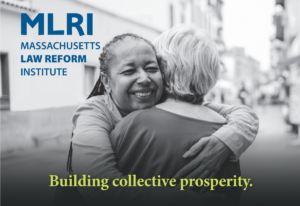Celebrating Martin Luther King Jr. Day 2023
As we celebrate Martin Luther King Jr. Day today, we are taking inspiration from Dr. King’s lifelong commitment to economic justice. Dr. King’s anti-poverty advocacy is often glossed over in the pursuit of a simple, sanitized story of King and his legacy – but there is no doubt his dream of justice included the eradication of poverty.
Q&A with Iris Gomez, Senior Immigration Attorney
 Mass Law Reform is powered by our advocates – talented and committed individuals who work together to fight for the needs of low-income people. Our second advocate is Iris Gomez, a Senior Staff Attorney in Immigration.
Mass Law Reform is powered by our advocates – talented and committed individuals who work together to fight for the needs of low-income people. Our second advocate is Iris Gomez, a Senior Staff Attorney in Immigration.
Iris Gomez joined MLRI as an immigration attorney in March 1992. A nationally-recognized immigration law expert, she directs MLRI’s Immigrants Protection Project. She is the former chair of the National Immigration Law Center’s board of directors and has played leadership roles in numerous bar associations, government task forces, and community organizations, in addition to teaching immigration law at Boston area law schools. She currently serves as a Trustee of the Hyams Foundation. In addition to her professional accomplishments, she is the author of the Boston Globe best-seller TRY TO REMEMBER, an immigrant coming-of-age novel that won praise from prominent national magazines such as O, The Oprah Magazine as well as an International Latino Book Award.
Q&A with Jamie Sabino, Deputy Director of Advocacy
 Mass Law Reform is powered by our advocates – talented and committed individuals who work together to fight for the needs of low-income people. We want to highlight these advocates, starting with Jamie Sabino, MLRI’s Deputy Director of Advocacy.
Mass Law Reform is powered by our advocates – talented and committed individuals who work together to fight for the needs of low-income people. We want to highlight these advocates, starting with Jamie Sabino, MLRI’s Deputy Director of Advocacy.
Jamie Sabino joined MLRI in October 2014. She is the Deputy Director of Advocacy and the Managing Attorney of the Civil Legal Needs for Victims of Crime Initiative (CLAVC). The CLAVC Initiative is supported by the Massachusetts Office for Victim Assistance through a Victims of Crime Act of 1984 (VOCA) grant from the Office for Victims of Crime, Office of Justice Programs, U.S. Department of Justice.
In addition, she serves as lead advocate for the Domestic Violence Legal Assistance Project (DVLAP) including facilitating the Family Law Task Force, a statewide group of legal services family law attorneys, attorneys in domestic violence service provider agencies, and attorneys involved in family law pro bono programs and law school clinics.
Indigenous Peoples Day 2022
Today, MLRI observes Indigenous Peoples Day, a day to celebrate and honor Native American people’s cultures and contributions. For far too long, the historical facts and present realities of indigenous communities have been obfuscated and overlooked. Despite the common narrative that relegates Indigenous peoples to the past, there are presently thousands of Indigenous people across the state fighting to survive and thrive in Massachusetts. Their contributions to society are invaluable and deserve recognition.
MLRI Files Successful Joint Amicus Brief on Behalf of Advocacy Organizations
Last month, Mass Law Reform, Greater Boston Legal Services, South Coastal Counties Legal Services and the Legal Services Center of Harvard Law School submitted an amicus brief for the case of Slavin v. Lewis in Norfolk Superior Court, representing six advocacy groups who serve survivors of domestic abuse. Amicus briefs, also known as friend of the court briefs, can be a key component of efforts to support low income survivors of domestic abuse. Amicus briefs are an opportunity to inform appellate courts on how their decisions may affect people beyond the parties in an individual case.
Statement of Georgia D. Katsoulomitis, Executive Director of the Massachusetts Law Reform Institute, in Response to the Dobbs v. Jackson Decision
The U.S. Supreme Court’s decision in Dobbs v. Jackson Women’s Health Organization is a stunning reversal of legal precedent and the loss of a constitutional right that has been protected for almost half a century. The reversal of Roe v. Wade is not only a devastating loss of reproductive rights for women in the United States but it is also an affront to the fundamental right to bodily autonomy and to our privacy rights. Furthermore, it opens the door to legal challenges that threaten to weaken or eliminate other important fundamental rights and liberties.
Dobbs does not outlaw abortion in the United States; it simply leaves the legality of abortion access to each individual state. The consequence is that the choice of whether a woman has access to reproductive health services will depend on where in the United States she happens to live. Women of economic means who reside in states that restrict or outlaw access to abortion may have the financial ability to travel to states where abortion remains legal and accessible. However, low income women in states with restrictive abortion access now have no choice or options – at least not safe ones.
Senate Ways and Means FY 2023 Budget Proposal: Preliminary Analysis of Key Issues Affecting Low-Income Massachusetts Residents
On May 10, 2022, the Senate Committee on Ways and Means released its budget proposal for fiscal year 2023 (FY 23), which is referred to as Senate 4. The Massachusetts Law Reform Institute prepared this analysis of selected budget topics impacting low-income residents of the Commonwealth:
- Cash Assistance, SNAP and Related Items Administered by DTA
- Child Welfare: DCF and Related Items
- Criminal Justice Reform
- Health Issues in MassHealth and ConnectorCare
- Homeless Services
- Housing
- Legal Services/Massachusetts Legal Assistance Corporation

 The Massachusetts Law Reform Institute has been fighting to build a just and equitable Commonwealth for over 50 years. This year was no different — along with our partners, we’ve continued advocating for those who are most often overlooked when navigating shifting realities.
The Massachusetts Law Reform Institute has been fighting to build a just and equitable Commonwealth for over 50 years. This year was no different — along with our partners, we’ve continued advocating for those who are most often overlooked when navigating shifting realities.